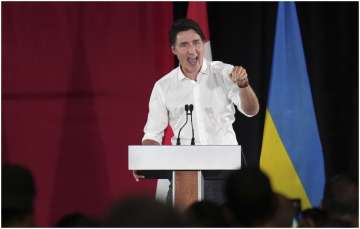'Deeply embarrassing': Trudeau after facing criticism for inviting Ukrainian veteran who fought for Nazis
The Canadian Prime Minister further warned that that the event may fuel Russian propaganda, as Vladimir Putin has alleged "neo-Nazi" elements operating within Ukraine.

After his government received widespread criticism for recently honouring a 98-year-old Ukrainian veteran who fought for the Nazis in World War II at a parliamentary event, Canadian Prime Minister Justin Trudeau called the decision "deeply embarrassing", CBC News reported.
In a major embarrassment for Canada, the country's lawmakers on Friday gave a standing ovation to Yaroslav Hunka, who fought on the behalf of the First Ukrainian Division, also known as the Waffen-SS Galicia Division, a voluntary unit under the command of Nazi Germany. This happened shortly after Ukrainian President Volodymyr Zelenskyy addressed the Parliament.
House Speaker Anthony Rota introduced Hunka as a 'war hero' for both Canadians and Ukrainians and proceeded to thank him for "all his service". Canadian lawmakers, including Trudeau, cheered for him while raised his fist in acknowledgement.
"It's extremely upsetting that this happened. The Speaker has acknowledged his mistake and has apologized. But this is something that is deeply embarrassing to the Parliament of Canada and by extension to all Canadians," Trudeau said while speaking to reporters on Parliament Hill on Monday.
Trudeau also warned that the event may fuel Russian propaganda, as Vladimir Putin has alleged that "neo-Nazi" elements are operating within Ukraine. "I think it's going to be really important that all of us push back against Russian disinformation and continue our steadfast unequivocal support for Ukraine," he said.
House Speaker faces calls to resign amid criticism
Russia is now seeking answers from Ottawa after the House of Commons gave a standing ovation to Hunka. "The Embassy is sending a note to the Canadian Foreign Ministry and the Prime Minister’s office demanding clarification. The SS is recognized as a criminal organization by the decisions of the Nuremberg Tribunal, which are an integral part of international law," said Russian Ambassador to Ottawa Oleg Stepanov.
"By honouring a member of this criminal community, the Canadian cabinet and members of parliament violated not only moral but also legal norms," he added.
Rota, who introduced Hunka in the Canadian Parliament, has faced widespread criticism and calls for his resignation after the event. Opposition parties New Democratic Party (NDP) and Bloc Québécois have said that it is not enough for him to simply apologise for inviting the Nazi veteran.
Bloc House leader Alain Therrien, said Hunka's invitation has created "a crisis of confidence without precedent" in the House of Commons. NDP's House leader Peter Julian said that Rota "regretfully" cannot continue in his role after the embarrassing incident.
"The Speaker has to be above reproach. This is an unforgivable error that puts the entire House in disrepute. Unfortunately, I believe a sacred trust has been broken," said Julian.
Canadian opposition leader Pierre Poilievre took to social media platform X, saying that the event was an "appalling error in judgement" on part of the Canadian Prime Minister to honour a Nazi veteran and demanded an apology from his side.
"No parliamentarians (other than Justin Trudeau) had the opportunity to vet this individual’s past before he was introduced and honoured on the floor of the House of Commons. Without warning or context, it was impossible for any parliamentarian in the room (other than Mr. Trudeau) to know of this dark past," said Poilievre.
"Canadians are sick and tired of a prime minister who never takes responsibility for the things that happen on his watch...He always finds someone else to throw under the bus. Are you that person?" Poilievre said while pointing at Rota in the Parliament.
The Friends of Simon Wiesenthal Center (FSWC) in a statement expressed that it was "deeply disturbed" over the recognition of the Ukrainian veteran who fought for Nazis and said that it was outraged that Hunka received a standing ovation from Canadian parliamentarians.
"Many, many questions need to be answered. The Prime Minister's Office so completely dropped the ball on this," said former House Speaker Andrew Scheer.
Additionally, Government House Leader Karina Gould said that she was "deeply hurt" as a Jewish person over the incident. "We trusted you. I think this unfortunate situation has been deeply embarrassing for Canada's Parliament and for Canada. It was deeply embarrassing for the president of Ukraine," she told Rota.
House Speaker Rota apologises
Meanwhile, Rota, who introduced the veteran in the Parliament, apologised, particularly to Jewish communities, in a statement where he took full responsibility for the initiative.
"I wish to make clear that no one, including fellow parliamentarians and the Ukraine delegation, was aware of my intention or of my remarks before I delivered them. This initiative was entirely my own, the individual in question being from my riding and having been brought to my attention," Rota said.
"I particularly want to extend my deepest apologies to Jewish communities in Canada and around the world. I accept full responsibility for my actions," he further said in the statement.
He apologised to Canadian MPs in person on Monday, saying that he personally regrets inviting the Ukrainian veteran, but gave no intentions to resign. He is likely to hold a meeting with the government and opposition House leaders, as per sources of CBC News.
It is worth mentioning the development came at a time when Canada has been facing a new low in relations with India after Trudeau alleged link of a Khalistani terrorist with Indian agents.
While addressing the Parliament on September 18, Monday, Trudeau said he had credible information about the involvement of New Delhi in the murder of extremist leader Hardeep Singh Nijjar-- a claim that the Ministry of External Affairs denied.
ALSO READ | Terrorists found 'safe haven' in Canada, we support India's 'strong' response: Sri Lanka